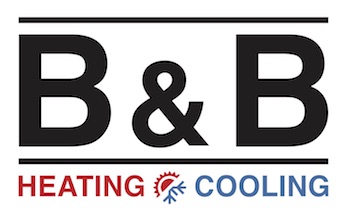
If you’re unsure whether your Florissant and St. Charles house has unhealthy indoor air quality (IAQ), it likely does.
We are indoors a lot. As a matter of fact, we’re inside up to 90% of the time, according to the U.S. Environmental Protection Agency. And the air inside houses could be 2–5 times worse than outdoors, which can create long-term health problems.
Most Common Sources of Unsatisfactory IAQ
We’ve put together a list of the most frequent causes of bad IAQ, the troubles they cause and how you can fix these indoor air pollutants. If you’re troubled by the air inside your house, we advise talking with a specialist like B & B Heating & Cooling about which options are best for your family.
Volatile Organic Compounds
Volatile organic compounds, or VOCs, are chemicals released by everyday household things.
They’re found in paint and stains in addition to:
- Furniture
- Carpet
- Building materials
- Cleaning products
- Cosmetics
- Air fresheners
- Candles
When these chemicals accumulate indoors, they can irritate your eyes, nose and throat. They might also lead to headaches and nausea. Regardless of whether your house is in a rural or industrial space, an EPA study found indoor levels of these fumes can be 2–5 times greater than the air outside your home.
Always use the manufacturer’s directions when painting or cleaning. Cracking a window can help chemicals disappear faster.
Air purification systems can also better your air. This unit partners with your heating and cooling unit to improve indoor air. When hunting for a model, ensure it’s specifically designed to eradicate VOCs.
Dust and Pet Dander
Dust and pet dander can trigger health problems like asthma and allergies, especially when it continuously gets recirculated by your house’s comfort system. While you can vacuum more routinely and install an improved air filter, an air filtration system may be a better fit.
This solution hooks to your HVAC equipment to give mighty filtration. Some models provide hospital-level filtration for getting rid of particles and bioaerosols.
Lingering Odors
Newer residences are securely sealed to boost energy efficiency. While this is fantastic for your heating and cooling bill, it’s not very good for your IAQ.
Musty odors can hang around for a greater amount of time as your house is pulling in reduced fresh air. Because keeping your windows open all year-round isn’t a possibility, here are two ways you can make your indoor air smell better.
An air purification system is placed in your ductwork to wipe out odors before they are redistributed. Find one with a carbon filter and the power to eliminate harmful VOCs. This equipment can also help keep your family healthy by eliminating most bacteria and common allergy triggers like pollen and mold spores.
A ventilation system takes out stale indoor air and exchanges it with crisp outdoor air. There are two kinds of equipment (heat recovery and energy recovery), so call our professionals for more information on which kind is ideal for your home.
Unbalanced Humidity
It’s essential your home’s humidity stays even. Air that has too much moisture can lead to mold, while dry air can lead to respiratory issues.
Our specialists suggest 40–50% for the best comfort. To keep yours steady, think about getting a whole-home humidifier or whole-home dehumidifier with your heating and cooling system.
Rather than having to lug a humidifier from room to room, this solution delivers consistent humidity around your house.
Carbon Monoxide
Carbon monoxide is colorless gas you can’t smell. It’s a byproduct of insufficient combustion in fuel-burning equipment, like gas heating systems, water heaters or fireplaces.
It creates an extreme health risk. In low levels, it can lead to flu-like ailments like headaches and nausea. It can be lethal in heavy concentrations.
We advise annual furnace maintenance to double-check your system is operating properly. This job allows our techs to pinpoint troubles before they begin, including malfunctions that can lead to carbon monoxide leaks.
The best approach to keep your house free of carbon monoxide is to install detectors. These alarms must be on all floors close to bedrooms and living spaces.
Improve Your House’s Air Quality with the B & B Heating & Cooling Pros
Aware that your house has poor air quality but not sure how to improve it? Or unsure which option is best for you? Give our friendly HVAC pros a call at 314-668-8530 or contact us online now. With free estimates and professional service, we’ll help you locate the best option for your home and budget.
